鲁教版六年级下册英语知识点总结
最新鲁教版英语六年级下册期末常考知识点汇总

最新鲁教版英语六年级下册期末常考知识点汇总2.—how old +be+主语?...多大年纪/几岁了?How old 意为“多大年纪;几岁”,用来询问年龄.答语常用--主语+be+基数词+years/months old. ......岁3.want to do sth. 想要做某事5.一年十二个月份,月份前常用介词in.Month的复数是months.6.do第2页)7.be busy doing sth.=be busy with sth.忙于(做)某事.She is busy doing her homework.=She is busy with her homework.她正忙着做家庭作业.8. When is Ailce's birthday?(第2页)艾丽斯的生日是什么时候?解析:Ailce's为名词所有格形式,意为“艾丽斯的”.名词所有格表示人或物的所有和所属关系,在句中作定语名词所有格的构成有's所有格、of所有格和双重所有格三种形式.1)'s所有格的构成.一般情况下在单数名词的词尾加's.Jim's book以-s 或-es结尾的复数名词,在词尾加“'”.The students' basketball不以-s结尾的复数名词,在词尾加's.Children's Day 儿童节注意:表示两者或两者以上共同拥有某物或某人时,只在后一个名词后加's.Tom and Jim's teacher 汤姆和吉姆的老师表示两人各自拥有不同的人或物时,两个名词都要加's ,Lucy's and Licy's brothers. 露西的哥哥和莉莉的哥哥2)of 所有格的构成名词+of +名词便构成of 所有格.a picture of my family3)双重所有格把of所有格和's所有格结合在一起表示所有关系的结构就构成了名词的双重所有格. a friend of my father's, a daught of Mr.Green's9.You第5页)Can 情态动词,“能;会”,表示说话人的情感、态度和能力.不能单独作谓语,只能和实义动词一起构成谓语,且没有人称和数的变化,其后的动词要用原形.含有情态动词的句子在变一般疑问句时,要把情态动词提前;变否定句时,在情态动词后加not.Can you see the ball under the chair?I can't see the ball.第二单元2.Because it's fun.(第8页)解析:1)because,连词“因为”,后面跟从句,陈述原因或理由,回答why提出的问句.--Why isn't Li Ping here? --Because she is ill.2)注意:because引导原因状语从句,在汉语中,我们常说因为....所以...,但是在英语中,因为和所以只能用其一.即在同一个句子中,because和so不能同时使用,用because就不能用so,用so 就不能用because.3)have fun doing ...,表示“做...很愉快”We have fun learning English.3. I am very busy on Friday.(第11页)解析,on Friday,“在星期五”.On 常表示在星期几或具体某一日或某一日的上午、下午、或晚上的名词前.年月周前要用in;具体时间点之前用at.只说上午、下午、晚上用in.4.from...to...,从...到...,既可指时间,又可指空间.5. finish ,作及物动词,后接动词时,要用动名词,即:finish doing sth.第三单元1 play chess 下国际象棋(教材第13页)play 玩,演奏.play+表示球类或棋类的名词,表示“参加(体育比赛或游戏)”,球类棋类名词前不用任何冠词.如play football,play basketball,play cardsplay the guitar 弹吉他.Play+表示乐器的名词,表示“吹奏、弹奏某种乐器”,乐器名词前要加定冠词the.如play the violin ,play the piano巧记play的用法:打球玩牌下象棋,其后不能把the 加;若把乐器来演奏,定冠词the 必须跟;与人比赛或扮演,动词play它都管.第三单元4.What club do you want to join?你想加入什么俱乐部?句型分析:本句是what 引导的特殊疑问句,what是特殊疑问词,它既可以单独使用,对事物进行提问,也可以和名词或名词短语共同构成一个特殊疑问词短语,放在句首,构成特殊疑问句.如:What color do you like? What class are you in ?注意:特殊疑问句是对句中的某一成分进行提问,句首用疑问词,句末用问号,一般用降调朗读.5. What about you?你呢?(教材第14页)What abot...?意为“......怎么样”与How about...?同义,常用于询问消息、征求意见或建议,其中about为介词,后接名词、代词或动词的-ing形式.如:I want to walk to school.What/How about you?6. You're very good at telling stories.你非常擅长讲故事.(教材第14页) 1)be good at 意为“擅长”,相当于do well in,后可接名词、代词或动词的-ing形式. I'm good at English.He is good at drawing.=He does well in drawing.2)tell的常用结构:tell后常跟双宾语,即tell sb.sth.(=tell sth. to sb.)意为“告诉某人某事”.tell sb.(not)to do sth. 告诉某人(不要)做某事7 Sounds good听起来不错.(教材第14页)sound作连系动词,意为“听起来”,常接形容词作表语.常用sound like ...后常接名词.That sounds like a good idea.同类归纳:可接形容词的感官动词:look,smell,feel,taste等都是连系动词,与sound 用法相同,其后均可接形容词作表语,意思分别为“看/闻/摸/尝”;look/smell/feel/taste like,意为“看/闻/摸/尝起来像......”9.Are you good with old people?你善于与老人相处吗?(教材第17页)be good with...善于应付......,对......有办法,相当于get on well with. She is good with her friends.=She gets on well with her friends.他与朋友们相处得好.拓展:与good有关的短语:be good at 擅长 David is good at swimming.be good to...对......好 Be good to him,OK?be good for ...对......有益Milk is good for our health.10.They can tell you stories and you can make friends.(教材17页)他们可以给你讲故事,你们可以交朋友.make friends 意为“交朋友”,表示“和......交朋友”,用make friends with sb. I want to make friends with you.11. Then we need you to help with sports for English-speaking students.(教材第17页)要你帮助说英语的学生开展体育运动.1)help (sb.)with sth.在某方面帮助(某人).Can you help me with my homework?2)help sb.(to)do sth.帮助某人做某事.My brother often helps me (to)do my homework.我哥哥经常帮我做作业.3)Need做实义动词,意为“需要”.此时need有人称和数的变化,后常接名词、代词或动词不定式.4)need sb. to do sth.需要某人做某事.第四单元1.get dressed 为动词短语,意为“穿上衣服”,相当于be dressed.get dressed是“get+形容词”结构,强调“穿”的动作.2.注意:如果后面有表示“衣服或颜色”的名词,dressed后面需用介词in,即“get/be dressed in +表示衣服/颜色的名词”,强调“穿”的状态.3.what time do you usually get up,rick?里克,你通常几点起床?(教材第19页)1)What time 意为“什么时候”,用来提问具体的时间点.注意:回答what time 提出的问题,必须用具体的时间,即“点钟或几点几分”. 2)time为不可数名词,意为“时间”,没有复数形式3)易混辨析:what time 与when表示什么时候的区别What time 用来询问具体的时间点,表示的时间比较精确,一般指“几点钟;几点几分”等.When既可以用来询问时间点,也可以用来询问时间段;询问年份、月份、日期时,只能用when.---What time do you get up?---At six o'clock.When is your birthday?When do you usually go to school?4.辨析:intertesting和interestedInteresting “有趣的;令人感兴趣的”,通常修饰物Intetested 感兴趣的;对...感兴趣;通常修饰人,且多用于结构中.5..6:30 am.(第22页)早上六点半解析:时间的读法1)钟点的正读法:先读小时,在读分钟;如果需要区分上下午,可在时间后加am或Pm.4:30 pm读作four thirty pm2)钟点的倒读法:前半小时的读法:分钟数+past+钟点数;30分钟用half;15分钟用a quarter.8: 14读作fourteen past eight 8:30读作half past eight 8:15读作a quarter past eight后半小时的读法:所差分钟数+to+下一整点数;15分钟用a quarter.8:46 读作fourteen to nine 8:45 读作a quarter to nine或fifteen to nine6.do my homework.(第22页)做我的家庭作业.解析do one's homework 固定搭配“做某人的家庭作业”,do作动词“做;干”,指做具体的工作,强调行为动词.其后的宾语常常是lesson,work,homework,exercise等.homework意为“家庭作业”,是不可数名词,其中one's代表形容词性物主代词,在句中根据前面的主语选用相应的物主代词.Tom does his homework after school.注意:do one's homework中的do是实义动词,变否定句时,要在其前加助动词do的适当形式,(do,does,did),再加not,变疑问句时,要将助动词do的适当形式提到主语前,谓语动词用动词原形.I don't do my homework after school.Does Li Ming do his homework by himself?Lucy doesn't do her homework on Sunday.7. 辨析:many和muchMany很多的,修饰可数名词的复数形式.Much很多的;大量的,修饰不可数名词.8. After school,I sometimes play basketball for half an hour.(第23页) 放学后,我有时打半个小时的篮球.解析:1)sometimes作频度副词,意为“有时”,相当于at times或from time to time可以放在句中,也可以放在句首,常与一般现在时或一般过去时连用.Sometimes my father drives me to school.有时爸爸开车送我去上学.2)注意:对频度副词提问要用how often,意为“多久一次”.3)“for+一段时间”是介词短语,表示某事持续了多长时间,,对其提问用疑问词how long.You can keep this book for a week.这本书你可以借一周.--How long will you stay in Beijng? ---For about three days.9. In the evening,I解析:either...or...意为“或者...或者...;要么...要么...”.连接句中两个并列的成分,表示两者之一.You may either stay at home or go with us.你要么呆在家里要么跟我们一道去.He is either in the classroom or in the library.他不是在教室就是在图书馆.注意:either ...or...连接两个主语时,谓语动词应与最近的一个主语在人称和数上保持一致,这就是我们常说的“就近一致原则”.10.At twelve,she eats lots of fruit vegetables for lunch.在十二点,她午饭吃很多水果和蔬菜.(第23页)解析1)lots of “许多;大量”,既可以修饰可数名词的复数形式,(相当于many);又可以修饰不可数名词,(相当于much);只用于肯定句中,与a lot of 是同义短语.11.Here are your clothes.这是你的衣服.(第24页)解析:这是一个倒装句.在英语中,以副词here.There开头的句子,如果主语是名词,则用倒装语序,连系动词是用is还是are取决于后面的名词是单数还是复数.HHere are your keys.注意:主语为代词时,不用倒装.HHere you are.给你.第五单元1.How do you get to school?(第25页)how疑问词,意为“如何;怎样;以何种方式;用什么手段”.本句为how引导的特殊疑问句,用来询问去某地的交通方式.其回答方式主要有两种:1)take +a/the +表示交通工具的名词,是动词短语,在句中作谓语.2)by+表示交通工具的单数名词或on/in+a/the+表示交通工具的单数名词,是介词短语,作方式状语.How do you go to work?— By bus.I walk to school./I get to school on foot.我步行到校.I ride my bike to school./I get to school by bike./I get to school on my bike.我骑自行车到学校.I take the bus to school./I get to school by bus./I get to school on the bus.我乘公共汽车到校.注意:on foot;by bike;by bus;by subway;by train;by car等词组的名词前不能加任何冠词或其他修饰词.get此处用作不及物动词,意为“到达”,表示到达某地,常与to连用,后跟地点、方位名词作宾语.注意:但如果后面跟的是there,here,home等副词时,则不需要加to.They'll get to Beijing at six tonight.(接地点名词)When do you get home?(接地点副词)2.I ride my bike.我骑自行车.解析1)ride one's bike 意为“骑自行车”,也可表达成go by bike或go on one's bike,某些表示交通方式的动词短语可用介词短语替换.Mary often rides her bike to go to school .=Mary often goes to school by bike.=Mary often goes to school on her bike.注意:ride one's bike 是动词短语,在句中作谓语.而by bike或on one's bike 都是介词短语,只能作状语.2)交通方式的表达:用动词表达take +a/the+交通工具;walk/ride/fly/drive+to +地点用介词表达by+交通工具;in/on+a/the/one's +交通工具注意:on foot,by bike,by bus,by subway,by train,by car等词组的名词前不能加任何冠词或其他修饰词.3.one hundred and five.(第26页)一百零五.解析1)hundred 数词,意为“百”.百位数中的十位和个位不为零时,应说成“hundred and+...”,102读作one hundred and two.339读作three hundred and thirty nine.2)当表示具体的“几百”时,用“基数词+hundred”表示,注意此时hundred 不加-s.eight hundred students;three hundred trees3)拓展hundreds of 意为“数百的;成百上千的”,表示一个不确定的数量.其后可接可数名词复数形式.注意这时hundred后有是s,且后面有介词of,但不能与数词连用.There are hundreds of people in the restaurant.与hundred用法类似的单词还有:thousand“千”,million“百万”,billion“十亿”.3.How long does it take...?(第26页)...花费多长时间?解析how long 意为“多久;多长时间”,用来询问某个动作所持续的时间,其谓语动词为延续性动词,答语为表示一段时间的名词性短语.How long will I have to wait?我要等多久呢?About three days.大约三天.4.It takes...它花费...(第26页)解析take 此处作动词,表示“花费”,常用于It takes sb. some time to do sth.句型中,意为“做某事花费某人多长时间”.It takes me an hour to get to the railway station.到火车站花费我一个小时时间.It took me two huors to finish the work.我花了两个小时去完成这份工作.注意:it是形式主语,真正的主语是句子后面的动词不定式短语(to do),谓语动词有时态的变化.It will take my parents one week to clean our house.我父母讲花一星期打扫我们的家.5.How far is it from your home to school?(26页)从你家到学校有多远?解析;1)how far意为“多远”,用来询问距离或路程,常用句型How far is it from A to B?或How far is B from A?意为“从A到B 有多远?”其答语“It's ...meter(s)/mile(s)/kilometer(s) (away).”意为“有....米/英里/千米(远)”.--How far is it from the park to the school?=How far is the school from the park?从公园到学校有多远?--It' about 3 miles.大约3英里.2)辨析how far 与how longhow far 多远,用来询问距离,指路程的远近.how long 多长,询问时间,指时间的长短;也可询问长度,指物体的长度.How far is it from the post office to the bank?How long does it take you to go to the park?--How long is the table?—About 1meter.6.Does Jane walk to school?(第27页)简步行去学校吗?1)句型分析:在一般现在时态中,当句子的主语是第三人称单数时,谓语动词也应使用第三人称单数形式(一般在词尾加-s),在变一般疑问句时,在句首加助动词does,谓语动词用原形,变否定句时,在主语后谓语动词前加doesn't,谓语动词变为原形.Mary likes music.--does Mary like music?---Mary doesn't like music.2)walk在此作动词,意为“步行”,表示步行去某地,可用短语walk to...,相当于go ...on foot,后跟表示地点的名词,后跟副词时,可省略to.They walk to school every day.=They go to school on foot.The park is near here.Let's walk there.9.Mary wants to know what he thinks of the trip.(教材第28页)玛丽想知道他认为这段旅程怎么样.解析:1)这是一个含有what引导的宾语从句的主从复合句.主句是Mary wants to know,其后what he thinks of the trip.是宾语从句.含有宾语从句的句子,无论主句是陈述句还是疑问句,宾语从句都必须用陈述语序,疑问词仍在句首,位置不变,.即“主句+宾语从句(主语+谓语+其他).”另外,宾语从句的时态与主句的时态要一致.I know where you live.Do you know which class he is in?2)注意:意为语序与陈述语序的对比:How does she get to school?Thomas wants to know how she gets to school.What's the weather like today?Do you know what the weather is like today?3)think of “认为;”,常和what连用,即:what do you think of ....,“你觉得...如何;你认为...怎么样?”用于征求别人的意见.相当于how do you like...? What do you think of /about this film?=How do you like this film?It's very interesting.For many students,it is easy to get to school.(第29页)解析1)for在本句中作介词,“对;对于”.I am too old for the job. For me ,dog is a good pet.2)for作介词,还可表示“为了;给”,表示目的.This letter is for you. My mother buys a book for me.3)many形容词,意为”许多”,后跟可数名词复数形式.I have many books.注意:much 也表示“许多”,但它修饰不可数名词.There is much water in the glass.3)it's +adj.+to do sth.句型,意为“做某事是...的”,其中it是形式主语,真正的主语是后面的动词不定式.It is easy to ride a bike. It is better to stay at home.It is difficult to finish this work.知识拓展:it's +adj.+for/of sb.+to do sth.的用法当前面的形容词是描述人的性格、品质的,用of,it's +adj.+of sb+to do sth.表示,形容词多用clever,good,kind,nice.,wrong等.It 's nice of you to help me learn English.你帮助我学英语真是太好了.如果形容词是描述某事对某人来说有何影响,则用it's +adj.+for sb+to do sth.句子的形容词都用important,necessary,impossible,difficult,easy,bad 等.It 's bad for you to eat much junk food.吃太多的垃圾食品对你没好处.11.There is a very big river between their school and the village.(第29页)解析1)there be 意为“有”,表示存在,即某地有某人或某物.Be后的词为该句型的真正主语,be 动词在数上,和它后面的名词保持一致.如果是可数名词单数或不可数名词,be 用单数,如果是可数名词复数,be 用复数,即“就近原则”. There is a clothes store near the library.易混辨析:there be 某地存在某物.Have表示某人或某物“拥有”某物,强调东西的归属.There are five pencils in the pencil box. Do you have a watch ?2)between介词,“在...之间”,一般指在两者之间.常和and 连用,构成both...and...“在...和...之间”,连接两个并列的成分.My house is between the park and the zoo.12.One 11-year-old boy,Liangliang,crosses the river every school.(第29页)解析“数词+单数名词+形容词”结构,相当于一个复合形容词,注意连字符,一般用在名词前作定语,其中表示计量的名词必须要用单数形式.a five –year-old boy,an 800-meter –long bridge.一座800米长的桥13.But he is not afraid.(第29页)解析afraid形容词,“害怕的;畏惧的”,是一个表语形容词.其用法为:1)be afraid of sth.意为“害怕某事或某物”.Most of the girls are afraid of dogs.2)be afraid to do sth.意为“害怕做某事”Her sister is afraid to stay at home alone.3)be afraid of doing sth.恐怕做某事,指担心或担忧做某事会引起某种后果. don't be afraid of asking for help.4)be afraid+(that)从句,“恐怕...”I 'm afraid (that) he can '5)为某件已经发生或可能发生的事表示歉意或作出判断,相当于sorry,这种说法显得比较文雅,谦逊.I 'm afraid I've broken your bike.真抱歉我把你的自行车弄坏了.14.They have to cross a very big river between their school and the village.(第29页)解析have to,“不得不;必须;得”,强调由于外界客观因素要求主语不得不做某事,有人称、数和时态的变化,其后接动词原形.Because he had no money,he had to drop(辍学,退出)out of school.15.Thanks for your last e-mile.解析:1)thanks for ...,因...而感谢,谢谢你...,相当于thank you for...,其后接名词,代词或动词的-ing形式.表示感谢的内容或原因.Thanks for your help. Thanks for inviting me.2)thank sb.for...,“因...而感谢某人”. Thank you for inviting me.3)last,上一个,刚过去的;最后的.本句中last 为形容词,作定语,“上一个;刚过去的”.Last 作形容词,还可表示“最后的”.Our group was the last(最后的)one at last(上一次的)speech contest.在上次的演讲比赛中,我们组是最后一名.第六单元1.don't run in the hallways.不准在走廊里跑.(第31页)解析1)Don't +动词原形是祈使句的否定形式,意为“不要...;禁止....”,相当于“you mustn't +动词原形”.Don't be late for class next time.2)祈使句的用法:用来表达命令、要求、请求、劝告的句子.其肯定形式以动词原形开头.常在句首或句末加please以示礼貌.句末用please,前面通常加逗号. 2.Don't arrive late for classs.(第31页)不准上课迟到.解析:1)arrive late for 与be late for 同义.都表示“做事迟到”.arrive late for侧重到达的时间晚,be late for 侧重状态.2)arrive 作不及物动词,“到达;抵达”,后跟介词in或at ,in后接大地方,at 后接小地方.Arrive后若是接地点副词,则不需要介词.We were tired when we arrived /reached/got home.我们到家时很累了.3.Don't run in the hallway.(第31页)不要在走廊里奔跑.解析:这是一个祈使句.祈使句用来表示请求、命令、劝告、建议等.祈使句的主语一般都是第二人称you,但往往省略.其肯定形式用动词原形开头,否定句式是在动词原形前加don't .常在句首或句末加please以示礼貌,句末用please时,前面通常加逗号.,please.Don't play football in the street.2)祈使句用法助记祈使句,祈使句,请求、命令或建议.主语是you常省去,动词原形开头记.否定形式要注意,句首要把't 加,要将客气用please,句首、句末没关系.4.Don't listen to music in class.(第31页)解析:1)listen to music,“听音乐”,其中,listen是不及物动词,后面接宾语时,要加介词to.Listen!The girl is singing .Listen to the teacher carefully.2)listen ;hearListen,不及物动词,后面接宾语时,要加介词to.侧重于“听”的动作.表示有意识的听.This girl likes to listen to the radio.Hear,及物动词,强调“听”的结果.听到;听见Can you hear anything?你能听到什么吗?3)in class ,固定短语,“在课上;上课时”,after class,“在课下;下课后”.5.Don't fight.(第31页)解析:fight动词,“打架”.Stop fighting ,you two.1)fight for,为...而战斗,后面常接抽象名词,表示为事业.自由等而斗争.表示战斗的目的.They are fighting for freedom.They fight for their country.2)fight about,为...而争吵,后接名词、动词、或宾语从句,表示吵架的原因. The two boys often fight about the toys.这两个男孩经常因玩具而争吵.3)fight against,对抗...;为反对...而斗争;后接事物名词、人和国家.表示在困难中抵抗.They fought against the enemy.他们和敌人作战.I 'll fight against you. 我会反抗你.4)fight with,“与...共同作战,用某种武器与某人交战(相当于fight against);和...打架”.只接表示人或国家的名词.Don't fight with me.不要和他打架.We must fight with you.我们必须和你一起并肩作战.6.wear a hat.(第32页)戴帽子.解析:1)wear为及物动词,“穿;戴”,强调穿、戴的状态.指习惯性的“穿(戴)假发或眼镜等”He always wears a red T-shirt.She likes wearing sunglasses.2)put on,“穿上,戴上”,强调穿的动作.It 's cold outside.Put on your coat ,please.3)be in +颜色/衣服,“穿着....颜色的衣服”,表状态.She is in red.4)wear,“穿(戴)着”,强调状态.Lucy's mother often wears a pair of glasses.7.This is very important.(第32页).解析:1)important,形容词,“重要的”,多用作be动词的后面,前面也常加very,表示“非常重要”.其名词形式是importance.They are very important.2)常用句型为:it is important for sb.to do sth.“做某事对某人来说是重要的”.It is important for us to learn English well.8.Can we bring music players to school?(第32页)我们可以把音乐播放器带到学校吗?解析1)本句为含有情态动词can的一般疑问句,肯定回答用:Yes,...can.否定回答用:No ,...can't.这是请求许可的句型.用来请求别人允许自己做某事.用于疑问句.Can we use youe car?2)can还可表示“能力”.“能;会”We can speak a little English.3)辨析;bring;take;get;carryBring “带来;拿来”,指从别处带到说话者所在的地方.Take,“带走;拿走”,指从说话者所在的地方带到远处去,常与介词to 连用,方向上与bring正好相反.His father often takes him to the zoo on weekends. Get “得到;获得”无方向性,常与介词from连用.People often get money from me.Carry“搬运”,无方向性.The box is too heavy for the boy to carry.9.Oh,and we also have to be quiet in the library.(第32页)解析:1)quiet,形容词,安静的,平静的,通常在句中作表语或定语,其反义词是niosy,“吵闹的;嘈杂的”.其副词形式是quietly.don't be niosy.You must be quiet.2)have to 必须;不得不.强调客观情况,有人称和时态的变化,后只能接动词原形.其否定形式是don't/doesn’t have to,“不必”.Do you have to leave so early?你必须这么早离开吗?You don't have to go there with me.3)辨析must 和have tomust,着重于说话者的主观看法,认为有义务、有必要去做某事,have to,表示客观的,被迫去做某事.I must write her a letter next week.The train was late; we have to wait for another two hours.Must 没有人称和时态的变化,而且可以直接加上not变否定句;也可以提到主语之前,变成一般疑问句;而have to 变否定句及一般疑问句都要借助于适当的助动词do,does did,等.You must not smoke in the classroom.You don't have to worry about her study.10.pracitce the guitar.(第34)解析1)practice此处用作及物动词,“练习;训练”,其后可接名词、代词、或动名词作宾语,不能接不定式.I often practice my English in the morning.He practices playing the piano every day.I practice reading English every day.2)只能接动名词作宾语的动词有:finish(完成),enjoy(喜欢)等.I finished reading the novel.I enjoyed working in China.11help his mom make breakfast.(第34页)解析:1)help作动词,“帮助”,help sb,(to)do sth.帮助某人做某事.不定式符号to可省略.相当于help sb. with sth.(名词).I can't help you lift the stone.= I can't help you with the stone.我不能帮你搬这块石头.12. on school night.(第34页)在上学期间的晚上解析:1)night,名词“晚上”,与之相对应的名词day指“白天”,常用短语:on school nights.在上学期间的晚上;on school days,在上学的日子.2)night前若有其他词修饰,指具体的某个晚上,应用介词on,如on winter nights,在冬天的晚上on Sunday nights,在星期天的晚上如果泛指晚上,则用介词at.如at night,在晚上.3)辨析night与eveningNight,晚上;夜里,指天完全黑下来一直到第二天天亮这段时间,尤指睡觉以后的夜晚,at night“在夜里”Evening,傍晚,晚上,指从晚餐到就寝这段时间,in the evening,“在晚上”. 13. there are too many rules.(第35页)有太多的规则.解析:1)这是一个there be 句型的肯定句,其后省略了at my house.There be+某人或某物+某地,表示“某地有某人或某物”.2)too many ,太多,其中too用作程度副词,表示“太”,修饰形容词many,many 后只能接可数名词的复数形式.There are too mant students in our school.3)辨析:too many和too much,much tootoo many太多的,其后要接可数名词的复数形式.too much,太多的,后接不可数名词,还可修饰动词作状语.He talks too much.There are too much water in my glass.I have too much homework this evening.much too ,太...,much 用来增强语气,后面接形容词或副词.This little boy is much too fat.这个小男孩太胖了.助记:too much ,much too,去掉前词看后头;much可接不可数,有时也用作副;too 则修饰形或副.too many请记住,其后名词必复数.14. relax,relaxing,relaxedRelax,动词,表示放松;使放松.Playing games always relaxes me.玩游戏总是使我放松.Relaxing 形容词,主要用来修饰物,表示“令人放松的”,The film is very relaxing.这部电影很令人放松.Relaxed,形容词主要用来修饰人,15. I must read a book before I can watch TV.(第35页)解析:1)read此处用作及物动词,“读;阅读”.I usually read storybooks after dinner.。
鲁教版英语(五四制)六年级下册_Unit6_单元要点梳理总结
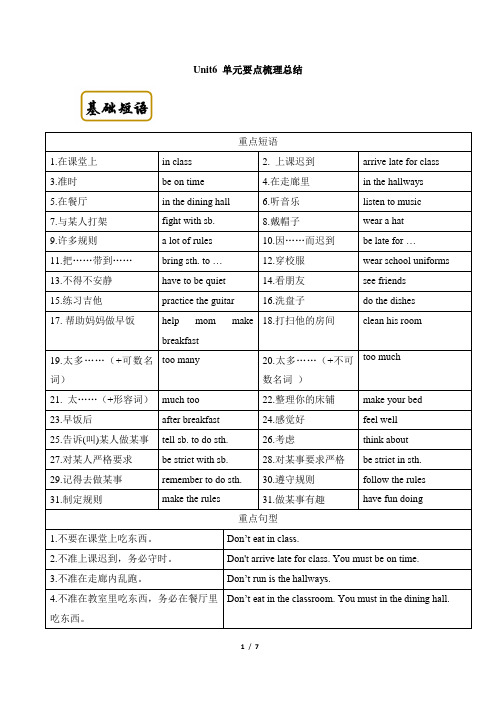
Unit6 单元要点梳理总结重点短语1.在课堂上in class2. 上课迟到arrive late for class3.准时be on time4.在走廊里in the hallways5.在餐厅in the dining hall6.听音乐listen to music7.与某人打架fight with sb. 8.戴帽子wear a hat9.许多规则 a lot of rules 10.因……而迟到be la te for …11.把……带到……bring sth. to … 12.穿校服wear school uniforms 13.不得不安静have to be quiet 14.看朋友see friends15.练习吉他practice the guitar 16.洗盘子do the dishes17. 帮助妈妈做早饭help mom makebreakfast18.打扫他的房间clean his room19.太多……(+可数名词)too many 20.太多……(+不可数名词)too much21. 太……(+形容词)much too 22.整理你的床铺make your bed23.早饭后after breakfast 24.感觉好feel well25.告诉(叫)某人做某事tell sb. to do sth. 26.考虑think about27.对某人严格要求be strict with sb. 28.对某事要求严格be strict in sth.29.记得去做某事remember to do sth. 30.遵守规则follow the rules 31.制定规则make the rules 31.做某事有趣have fun doing重点句型1.不要在课堂上吃东西。
Don’t eat in class.2.不准上课迟到,务必守时。
Don't arrive late for class. You must be on time.3.不准在走廊内乱跑。
鲁教版六年级英语下册重点短语及句子

鲁教版六年级英语下册重点短语及句子第一篇:鲁教版六年级英语下册重点短语及句子Unit1 When is your birthday? 短语1.你妈妈的生日your mother’s birthday2.十月十号October tenth3.出生日期;生日date of birth4.多大(岁数)1.她的生日聚会2.几岁3.英语测验4.学校郊游5.篮球足球比赛6.艺术音乐节7.三十八8.英语节9.体育节10.校庆日11.举办图书特卖会12.在学校图书馆13.这个学期14.在下午上午晚上15.来我们学校16.来参加我的生日聚会how oldher birthday partyhow oldEnglish testschool tripbasketballsoccer gameartmusic festivalthirty-eightEnglish DaySports DaySchool Dayhave a book salein the school librarythis termin the afternoonmorningevening come to our school come to my birthday party17.过得愉快have a good time 18.我妹妹的生日my sister’s birthday 19.生日快乐happy birthday 20.再见good-bye 句子1.你妈妈什么时候过生日?When is your mother’s birthday? 2.你父亲多少岁?50.How old are your father?He is fifty.3.你的生日是什么时候?我的生日是六月四号。
When is your birthday? My birthday is June fourth.4.出生日期:三月二十一日。
DATE OF BIRTH: March 21st.5.今天几月几号?1月1号。
鲁教版英语六年级下册期末常考知识点汇总

六年级下册期末常考知识点汇总1.--when is +主语+birthday?某人的生日什么时候?when疑问副词,引导提殊疑问句,其结构为“when+一般疑问句?”when可以对年、月、日以及时刻进行提问或者询问某一动作发生的时间。
--It 's+月+日,+年。
是...年...月...日.When is your birthday?My birthday is on May 2nd./It is on May 2nd2.—how old +be+主语?...多大年纪/几岁了?How old 意为“多大年纪;几岁”,用来询问年龄。
答语常用--主语+be+基数词+years/months old. ......岁3.want to do sth. 想要做某事4.happy birthday生日快乐,其答语为:thank you./thanks a lot./thank you very much.5.一年十二个月份,月份前常用介词in。
Month的复数是months。
6.do you want to come to my birthday party?(第2页)7.be busy doing sth.=be busy with sth.忙于(做)某事。
She is busy doing her homework.=She is busy with her homework.她正忙着做家庭作业。
8. When is Ailce's birthday?(第2页)艾丽斯的生日是什么时候?解析:Ailce's为名词所有格形式,意为“艾丽斯的”。
名词所有格表示人或物的所有和所属关系,在句中作定语名词所有格的构成有's所有格、of所有格和双重所有格三种形式。
1)'s所有格的构成。
一般情况下在单数名词的词尾加's。
Jim's book以-s 或-es结尾的复数名词,在词尾加“'”。
鲁教版六年级下册英语 全册重点word版本

请联系网站删除资料收集于网络,如有侵权Good morning.Unit 1一.重点词组:早上好1.Good morning下午好Good afternoon答语相同。
Good evening 晚上好你好,弗兰克。
2. Hello, Frank!你(身体)好吗?3. A: How are you?I'm OK , thanks. And you? 我很好,谢谢。
你呢?B: (I'm) fine/ A: (I'm)fine/OK, too. 我也很好。
4. thanks = thank you 谢谢英国广播公司BBC光盘CD5. HB(铅笔芯)硬黑What's this in English? Unit 2一.重点词组:What's this/that? 这/那是什么? 1.It's a/an + 单数物品1) What's this/that? 这/那是什么?2)What's this/that? 这/那是什么?It's a ruler. (这/那是)直尺。
It's an apple. (这/那是)苹果。
2. What's this/that in English? 这/那用英语怎么说?It's a/an + 单数物品What's this in English? 这用英语怎么说?It's a jacket. 夹克衫What's that in English? 那用英语怎么说?It's an orange. 橘子。
3. a 和an是不定冠词,只用在可数名词单数前面,表示“一”。
a用在以辅音音素开头的单词前;an用在以元音音素开头的单词前。
这里的元音音素和辅音音素是指读音,而不是指字母。
如:a pen /pen/ 一支钢笔(/p/为辅音音素)只供学习与交流.请联系网站删除资料收集于网络,如有侵权) ?an orange /' ?rind / 一个桔子(/? /为元音音素千克;公斤停车场;停车位NBA(美国)全国篮球协会kg4. PSpell it, please. = Please spell it. 请拼读它。
鲁教版六下英语知识点精华

65.watch…doing 观看…正在做某事 66. enjoy doing 喜欢做…… 67. spend time doing sth. 花时间做某事 68. Go along Bridge Street and turn left when (当)you see the library.(指路句型) 69.It takes sb. sometime to do 花费某人多 长时间做某事 70.hope/wish to do希望做某事
46. After dinner, I can’t relax either.晚饭后, 我也不能放松。 47.It’s important for sb. to do sth. 对某人来 说做某事很重要。It’s best to do th 记住去做某事 remember doing sth. 记得做了某事
39. do/wash the dishes 洗盘子 40. be strict with sb. in sth. 就某事对某人 要求严格 41. learn to play the guitar 学习弹吉他 42. have fun/a good time doing sth. 做某事 玩的开心 43.practice doing sth. 练习做某事 44.too many+可数名词复数,太多; too much +不可数名词, 太多 45.much too+形容词 太…
49. Let’s(not) do …让我们(不)做… 50.be from= come from 来自
51. kind of boring 有点无聊 52. like… a lot 非常喜欢… 53.one of Thailand’s symbols 泰国的象征 之一 (单数) 54.be in great danger 在巨大的危险中 55.buy things made of ivory 买象牙做的东 西 56. cut down many trees =cut them down 57.go to the movies 去看电影 58.any other night 其他任何一个夜晚
鲁教版六年级下册英语 全册重点资料讲解
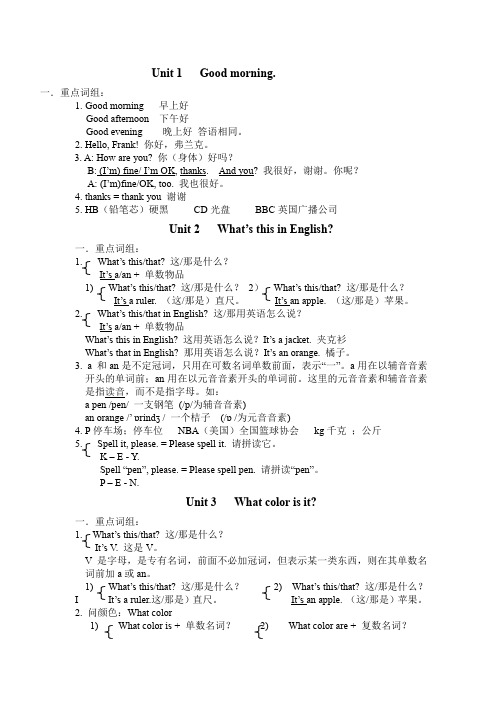
Unit 1 Good morning.一.重点词组:1.Good morning 早上好Good afternoon 下午好Good evening 晚上好答语相同。
2. Hello, Frank! 你好,弗兰克。
3. A: How are you? 你(身体)好吗?B: (I’m) fine/ I’m OK, thanks. And you? 我很好,谢谢。
你呢?A: (I’m)fine/OK, too. 我也很好。
4. thanks = thank you 谢谢5. HB(铅笔芯)硬黑CD光盘BBC英国广播公司Unit 2 What’s this in English?一.重点词组:1. What’s this/that? 这/那是什么?It’s a/an + 单数物品1) What’s this/that? 这/那是什么?2)What’s this/that? 这/那是什么?It’s a ruler. (这/那是)直尺。
It’s an apple. (这/那是)苹果。
2. What’s this/that in English? 这/那用英语怎么说?It’s a/an + 单数物品What’s this in English? 这用英语怎么说?It’s a jacket. 夹克衫What’s that in English? 那用英语怎么说?It’s an orange. 橘子。
3. a 和an是不定冠词,只用在可数名词单数前面,表示“一”。
a用在以辅音音素开头的单词前;an用在以元音音素开头的单词前。
这里的元音音素和辅音音素是指读音,而不是指字母。
如:a pen /pen/ 一支钢笔(/p/为辅音音素)an orange /’ ɒrindʒ / 一个桔子(/ɒ /为元音音素)4. P停车场;停车位NBA(美国)全国篮球协会kg千克;公斤5. Spell it, please. = Please spell it. 请拼读它。
鲁教版六年级英语下册重点

鲁教版六年级英语下册重点is +主语+birthday某人的生日什么时候when疑问副词,引导提殊疑问句,其结构为“when+一般疑问句”when可以对年、月、日以及时刻进行提问或者询问某一动作发生的时间。
--It 's+月+日,+年。
是...年...月 ...日.When is your birthdayMy birthday is on May 2nd./It is on May 2nd2.—how old +be+主语...多大年纪/几岁了How old 意为“多大年纪;几岁”,用来询问年龄。
答语常用--主语+be+基数词 +years/months old. ......岁to do sth. 想要做某事birthday生日快乐,其答语为:thank you./thanks a lot./thank you very much.5.一年十二个月份,月份前常用介词in。
Month的复数是months。
busy doing sth.=be busy with sth.忙于(做)某事。
She is busy doing her homework.=She is busy with her homework.她正忙着做家庭作业。
8. When is Ailce's birthday(第2页)艾丽斯的生日是什么时候解析:Ailce's为名词所有格形式,意为“艾丽斯的”。
名词所有格表示人或物的所有和所属关系,在句中作定语名词所有格的构成有's所有格、of所有格和双重所有格三种形式。
1)'s所有格的构成。
一般情况下在单数名词的词尾加's。
Jim's book以-s 或-es结尾的复数名词,在词尾加“'”。
The students' basketball不以-s结尾的复数名词,在词尾加's。
Children's Day 儿童节注意:表示两者或两者以上共同拥有某物或某人时,只在后一个名词后加's。
鲁教版英语六年级下册期末常考知识点汇总

鲁教版英语六年级下册期末常考知识点汇总2.—how old +be+主语?...多大年纪/几岁了?How old 意为“多大年纪;几岁”;用来询问年龄。
答语常用--主语+be+基数词+years/months old. ......岁3.want to do sth. 想要做某事5.一年十二个月份;月份前常用介词in。
Month的复数是months。
6.do第2页)7.be busy doing sth.=be busy with sth.忙于(做)某事。
She is busy doing her homework.=She is busy with her homework.她正忙着做家庭作业。
8. When is Ailce's birthday?(第2页)艾丽斯的生日是什么时候?解析:Ailce's为名词所有格形式;意为“艾丽斯的”。
名词所有格表示人或物的所有和所属关系;在句中作定语名词所有格的构成有's所有格、of所有格和双重所有格三种形式。
1)'s所有格的构成。
一般情况下在单数名词的词尾加's。
Jim's book以-s 或-es结尾的复数名词;在词尾加“'”。
The students' basketball不以-s结尾的复数名词;在词尾加's。
Children's Day 儿童节注意:表示两者或两者以上共同拥有某物或某人时;只在后一个名词后加's。
Tom and Jim's teacher 汤姆和吉姆的老师表示两人各自拥有不同的人或物时;两个名词都要加's ;Lucy's and Licy's brothers. 露西的哥哥和莉莉的哥哥2)of 所有格的构成名词+of +名词便构成of 所有格。
a picture of my family3)双重所有格把of所有格和's所有格结合在一起表示所有关系的结构就构成了名词的双重所有格。
鲁教版英语六年级下册期末常考知识点汇总
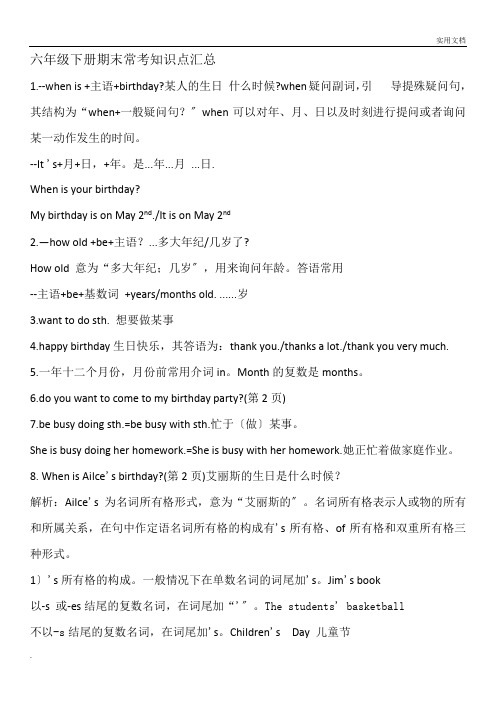
六年级下册期末常考知识点汇总1.--when is +主语+birthday?某人的生日什么时候?when疑问副词,引导提殊疑问句,其结构为“when+一般疑问句?〞when可以对年、月、日以及时刻进行提问或者询问某一动作发生的时间。
--It 's+月+日,+年。
是...年...月...日.When is your birthday?My birthday is on May 2nd./It is on May 2nd2.—how old +be+主语?...多大年纪/几岁了?How old 意为“多大年纪;几岁〞,用来询问年龄。
答语常用--主语+be+基数词+years/months old. ......岁3.want to do sth. 想要做某事4.happy birthday生日快乐,其答语为:thank you./thanks a lot./thank you very much.5.一年十二个月份,月份前常用介词in。
Month的复数是months。
6.do you want to come to my birthday party?(第2页)7.be busy doing sth.=be busy with sth.忙于〔做〕某事。
She is busy doing her homework.=She is busy with her homework.她正忙着做家庭作业。
8. When is Ailce's birthday?(第2页)艾丽斯的生日是什么时候?解析:Ailce's为名词所有格形式,意为“艾丽斯的〞。
名词所有格表示人或物的所有和所属关系,在句中作定语名词所有格的构成有's所有格、of所有格和双重所有格三种形式。
1〕's所有格的构成。
一般情况下在单数名词的词尾加's。
Jim's book以-s 或-es结尾的复数名词,在词尾加“'〞。
英语鲁教版六年级下册 知识点
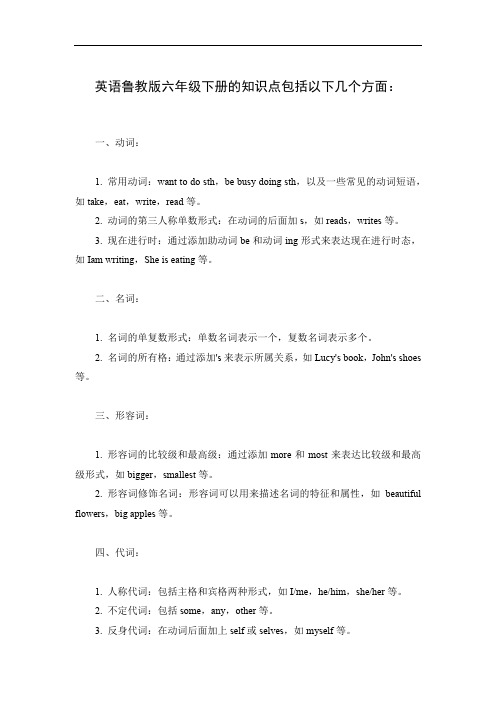
英语鲁教版六年级下册的知识点包括以下几个方面:一、动词:1. 常用动词:want to do sth,be busy doing sth,以及一些常见的动词短语,如take,eat,write,read等。
2. 动词的第三人称单数形式:在动词的后面加s,如reads,writes等。
3. 现在进行时:通过添加助动词be和动词ing形式来表达现在进行时态,如Iam writing,She is eating等。
二、名词:1. 名词的单复数形式:单数名词表示一个,复数名词表示多个。
2. 名词的所有格:通过添加's来表示所属关系,如Lucy's book,John's shoes 等。
三、形容词:1. 形容词的比较级和最高级:通过添加more和most来表达比较级和最高级形式,如bigger,smallest等。
2. 形容词修饰名词:形容词可以用来描述名词的特征和属性,如beautiful flowers,big apples等。
四、代词:1. 人称代词:包括主格和宾格两种形式,如I/me,he/him,she/her等。
2. 不定代词:包括some,any,other等。
3. 反身代词:在动词后面加上self或selves,如myself等。
五、句型转换:1. 疑问句:将一个陈述句转换为疑问句,需要改变动词的时态和语序。
2. 否定句:在动词前面加上not或者使用never来表示否定意义。
3. 一般现在时:表示通常或反复发生的动作或状态。
4. 一般过去时:表示过去发生的动作或状态。
5. 现在进行时:表示现在正在进行的动作或正在发生的状况。
6. 现在完成时:表示过去发生的动作对现在造成的影响或结果。
7. 比较级和最高级的使用。
8. 祈使句:表达命令、请求或建议的语言。
9. 语态转换:包括被动语态和主动语态的转换等。
以上是英语鲁教版六年级下册的部分知识点,对于每个知识点的学习和应用需要结合具体语境和语料进行深入理解和实践练习。
鲁教版(五四制)六年级英语下册各单元重点知识汇总
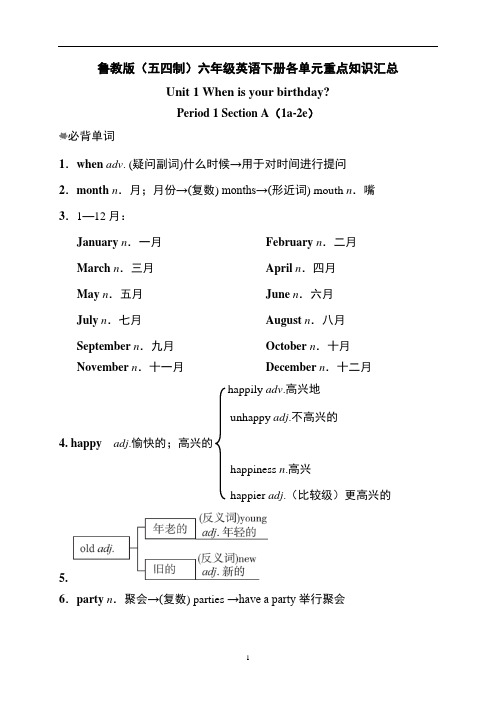
鲁教版(五四制)六年级英语下册各单元重点知识汇总Unit 1 When is your birthday?Period 1 Section A(1a-2e)必背单词1.when adv. (疑问副词)什么时候→用于对时间进行提问2.month n.月;月份→(复数) months→(形近词) mouth n.嘴3.1—12月:January n.一月February n.二月March n.三月April n.四月May n.五月June n.六月July n.七月August n.八月September n.九月October n.十月November n.十一月December n.十二月happily adv.高兴地unhappy adj.不高兴的4.happy adj.愉快的;高兴的happiness n.高兴happier adj.(比较级)更高兴的5.6.party n.聚会→(复数) parties →have a party举行聚会必背短语7.Alice's birthday艾丽斯的生日8.your father's birthday 你父亲的生日9.in August 在八月10.at three this afternoon今天下午三点钟必背句子11.—When is your birthday,Mike?迈克,你的生日是什么时候?—My birthday is on June 3rd.我的生日是在六月三日。
12.Happy birthday! 生日快乐!13.—How old are you? 你多大了?—I'm thirteen. 我十三岁了。
14. Well,do you want to come to my birthday party?哦,你想来参加我的生日聚会吗?15.—When is it? 聚会是在什么时候?—At three this afternoon. 今天下午三点钟。
鲁教版六年级下册英语知识点总结
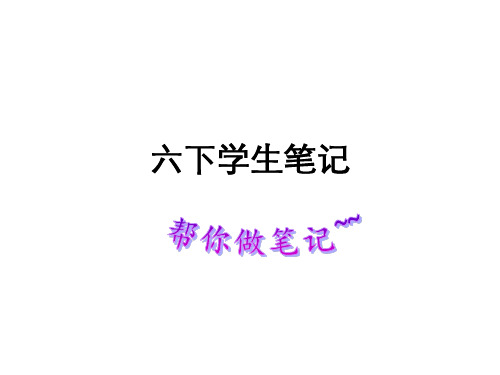
Unit2 重点短语
15.after that 在那之后
Unit2 重点句型
1.-What’s your favorite subject?你最喜欢的 科目是什么?=What subject do you like best? -My favorite subject is science. 我最喜欢的 科目是科学。=I like science best. 2.Her favorite fruit is strawberries.= She likes strawberries best.她最喜欢的水果是 草莓。 3.His favorite day is Sunday.= He likes Sunday best. 他最喜欢星期天。
Unit2 重点句型
11.-What day is it today? -It’s Friday. 12.What date is it today? It’s September 10th. 今天几号? 今天是9月10日。 13.The teacher says it is useful, but I think it is difficult. 老师说它有用,但我认为它很难。 14.It is a useful book. 这是一本有用的书。 15.Lunch is from 12:00 to 1:00. 午餐是12点到1点。
1.-When is your birthday? -My birthday is on May 2nd. 2.-When is your father’s birthday? -His birthday is on April 21st. 3.-Happy birthday! –Thank you, Bill. 4.-How old are you?=What’s your age? -I’m thirteen (years old).
鲁教版英语(五四制)六年级下册_Unit8_单元知识点汇总

Unit8 单元知识点汇总【短语归纳】1. watch TV 看电视2. read a newspaper 看报纸3. talk on the phone 通过电话交谈4. listen to 听5. use the computer 使用电脑6. make soup做汤7. wash the dishes 洗餐具8. kind of 有点儿【用法集萃】1. —What + be+ 主语+ doing? ……正在做什么?—主语+ be + doing sth. ……正在做某事。
2. I’d love / like to do sth. 我愿意做某事。
3. any other +可数名词单数其他任何一个……4. wish to do sth. 希望做某事【典句必背】1. —Why are you doing? 你在做什么?—I’m watching TV. 我在看电视。
2. —What’s she doing?她在做什么?—She’s washing her clothes. 她在洗她的衣服。
3. —What are they doing? 他们在做什么?—They’re listening to a CD. 他们在听一张CD唱片。
4. —Are you doing your homework? 你在做你的家庭作业吗?—Yes, I am. / No, I’m not. I’m cleaning my room.是的,我在做。
/不,我没有。
我在打扫我的房间。
5. Zhu Hui misse s his family and wishes to have his mom’s delicious zongzi.朱辉思念他的家人并希望吃上他妈妈的可口粽子。
【重点句式】1. 现在进行时的结构:主语+be+v-ing. (be动词和动词-ing两者缺一不可)考题形式:(1)已知be动词,考后面的动词形式(要加ing);(2) 已知后面的动词+ing,则前面用be动词。
鲁教版六年级下册英语全册知识点整理
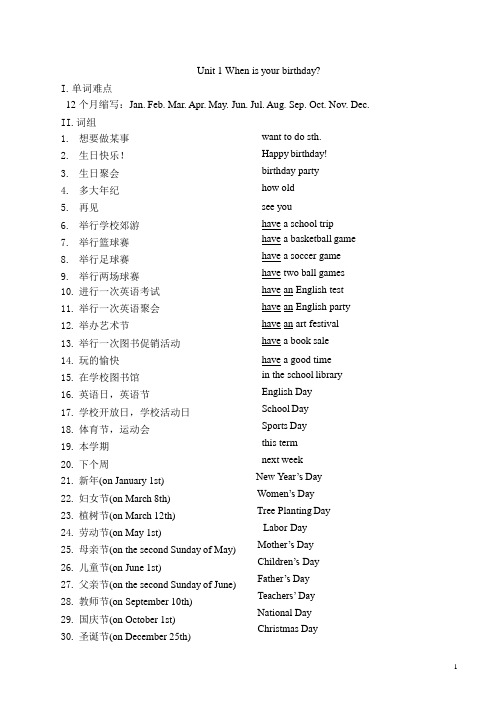
English Day
17. 学校开放日,学校活动日
School Day
18. 体育节,运动会 19. 本学期 20. 下个周 21. 新年(on January 1st) 22. 妇女节(on March 8th) 23. 植树节(on March 12th) 24. 劳动节(on May 1st) 25. 母亲节(on the second Sunday of May) 26. 儿童节(on June 1st) 27. 父亲节(on the second Sunday of June) 28. 教师节(on September 10th) 29. 国庆节(on October 1st) 30. 圣诞节(on December 25th)
3. 生日聚会
birthday party
4. 多大年纪
how old
5. 再见
see you
6. 举行学校郊游
have a school trip
7. 举行篮球赛 8. 举行足球赛 9. 举行两场球赛 10. 进行一次英语考试
have a basketball game have a soccer game have two ball games have an English test
24. 对某人严格要求
be strict with sb.
25. 对某事严格要求
be strict in sth.
II. Sentences (句子) (P9 Grammar Focus)
1. 让我们周六见吧。
Let’s meet on Saturday.
2. 今天星期几?
What day is it today?
Unit 1 When is your birthday?
- 1、下载文档前请自行甄别文档内容的完整性,平台不提供额外的编辑、内容补充、找答案等附加服务。
- 2、"仅部分预览"的文档,不可在线预览部分如存在完整性等问题,可反馈申请退款(可完整预览的文档不适用该条件!)。
- 3、如文档侵犯您的权益,请联系客服反馈,我们会尽快为您处理(人工客服工作时间:9:00-18:30)。
Unit3 重点短语
• school show 学校演出 on show 展览 • show sb. sth.= show sth. to sb. 给某人看 某物 • come and show us 来展示给我们看 • like/love doing(to do) sth. 喜欢做某事 • be in the school music club 在学校的音乐 俱乐部 • be free = have time 有空;有时间 • music teacher wanted 招聘音乐教师 • help sb. with/to do sth 帮某人做某事
Unit2 重点短语
1.favorite = like… best 最喜欢 2.have English= have an English class 上英 语课 3.have breakfast/lunch/dinner 吃早饭/中饭/ 晚饭 4.have a soccer game 举行足球比赛 5.have a school trip 组织学校旅行 6.have a party 举行聚会
六下学生笔记
Unit1核心知识
1. 1-12月单词拼写:一、二月后四个字母都 是uary;九、十一、十二月后五个字母是 ember。 2. 1-31序数词拼写:1,2,3特殊记,一般加th ,8去t,9去e,12 f把ve替,ty结尾只变y 为ie,几十几,只变个位就可以。 3. 询问生日与回答:When’s Mary’s birthday? It’s on+月日. 4.询问日期与回答:What’s the date today? It’s+月日.
1.-When is your birthday? -My birthday is on May 2nd. 2.-When is your father’s birthday? -His birthday is on April 21st. 3.-Happy birthday! –Thank you, Bill. 4.-How old are you?=What’s your age? -I’m thirteen (years old).
Unit3 重点句型
• Can you swim? Yes, I can. / No, I can’t. • What can you do ? I can dance. But I can’t sing. • What club do you want to join? I want to join the chess club. • You are good at telling stories. • We need help at the old people’s home. 在老年公寓,我们需要帮助。 • Do you have time on the weekend? 你周 末有时间吗?
Unit2 重点句型
11.-What day is it today? -It’s Friday. 12.What date is it today? It’s September 10th. 今天几号? 今天是9月10日。 13.The teacher says it is useful, but I think it is difficult. 老师说它有用,但我认为它很难。 14.It is a useful book. 这是一本有用的书。 15.Lunch is from 12:00 to 1:00. 午餐是12点到1点。
Unit1 重点句型
5.-Do you want to come to my birthday party? -Yes, I do. 6.On March 21st, we have a school trip in the afternoon.在三月21日下午,我们将进行 学校郊游。 7. Next month, we have an art festival. 下个 月,我们举行艺术节。 8.This is a really busy term! 这真是一个忙碌 的学期!
Unit1
9. my fifth birthday party 我的5岁生日聚会 10.an English test 一次英语考试 11.school trip 学校郊游 12.basketball game 篮球比赛 13.this term 这学期 14.next month 下个月 15.School Day 学校开放日 16.book sale 售书活动
Unit3 重点短语
Unit3 重点短语
• be good at (doing) sth = do well in sth 擅 长(做)某事 • be good with sb. 善于和某人打交道 • be good for sb/sth 对某人/某事有好处 • speak English 说英语 = say it in English用 英语说 • talk to/with sb. 和某人谈话;talk about sth谈论某事 talk to/with sb. about sth
Unit2 重点短语
7.play games with sb. 与某人玩游戏 8.the next day 第二天 9.for sure 确实 10.from… to… 从…到… 11.finish doing sth. 做完某事;结束某事 12.for two hours 用两个小时 13.be OK with sb. 对某人来说是合适的 14.thank you for (doing) sth 因为某事谢谢你
Unit3 重点短语
• • • • • • • English-speaking students 说英语的学生 the Students’ Sports Center 学生运动中心 call sb. at +电话号码 拨打…找某人 make friends with sb. 和某人做朋友 on the weekend 在周末 be in 参加 ask sb. for help 找某人寻求帮助
Unit3核心知识
1. 易考单词:swim-swimming,dancedancing,story-stories,writewriting,center,musician 2. 询问能力及回答:Can you swim? Yes, I can./No, I can’t. I can dance. 3. 描述擅长做某事:She is good at singing. 4. 描述善于应付某人:She is good with children.
Unit2核心知识
1. 科目(subject)单词拼写: P.E.,art,science,music,math,Chinese,geo graphy,history 2. 星期单词拼写:Sunday-Saturday 3. 描述性形容词拼写:boringinteresting/fun,difficulteasy,relaxing,useful 4. 询问最喜欢的科目及原因:What’s your favoritescience? Because it’s interesting.
• play soccer/chess/cards • play the • guitar/violin/piano/drums/trumpet/erhu(二 胡) • join the art/swimming/story telling club加 入美术/游泳/讲故事 俱乐部 • join the Party 入党 • want to join 想要加入 • tell stories= tell a story 讲故事
Unit1
17.English Day 英语日 18.art festival 艺术节 19.Sports Day 运动会 20.English party 英语聚会 21.be(am/is/are) busy doing sth 忙于做某事 22.be busy with sth 忙于某事
Unit1 重点句型
Unit2 重点句型
7.Who do you want to go with? 你想和谁一 起去? 8.He always plays games with us. 他总是 和我们一起玩游戏。 9.That’s for sure. 的确如此。 10.Are you free this Friday? Yes, I am. 这个周五你有空吗? 是的,我有。
Unit2 重点句型
16.They will finish cleaning the classroom in thirty minutes. 他们要30分钟内打扫干净 教室。 17.He usually plays computer games for two hours on Sunday. 他星期天通常玩两 个小时的电脑游戏。
Unit2 重点句型
4.-How’s your day? -Great! 棒极了! 5.I like Monday because I have P.E. and history. 我喜欢星期一,因为我上体育课和 历史课。 =I have P.E. and history , so I like Monday. 6.-Why do you like math?你为什么喜欢数学? -Because they are useful. 因为它们有用。
Unit3 重点句型
• They can tell you stories and you can make friends. 他们可以给你讲故事,你可 以交朋友。 • Can you talk to them and play games with them? 你能跟他们聊天并与他们做游戏吗 ? • Are you good with old people?你善于与老 人相处吗? • Then we need you to help with sports for English-speaking students. 那么, 我们 需要你帮助说英语的学生参加体育运动。
